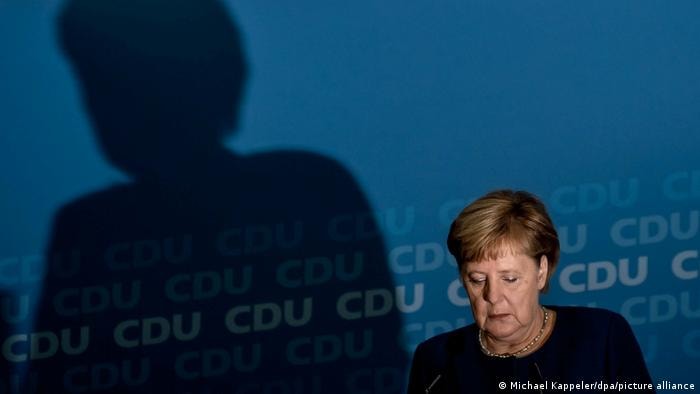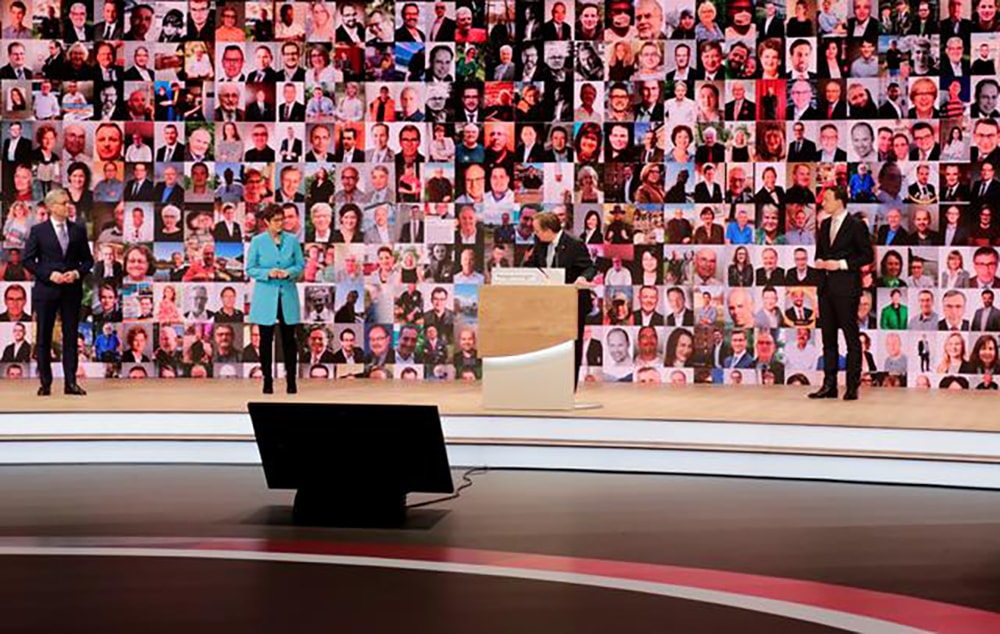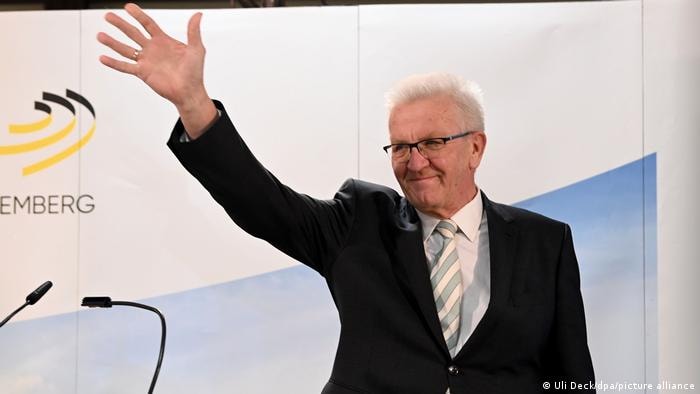Is an 'earthquake' about to happen in German politics?
(Baonghean.vn) - In Germany, the first state elections this year have shown the possibility of seismic changes to the political scene here. Many questions have begun to arise: Will the end of Angela Merkel's term as Chancellor also mark the decline of the CDU party? Is Germany about to see the centrist Green Party as its new guiding star?
CDU in decline?
The figures, which have just been released, show that little has changed in the first major votes of Germany’s “super election year”. Both incumbent western state premiers – Green politician Winfried Kretschmann in Baden-Württemberg and Social Democrat Malu Dreyer in Rhineland-Palatinate – were easily re-elected and appear to be free to start the process of forming their new governments.
But the crucial context of 2021 – with six state elections and a federal election, Merkel set to step down as chancellor next fall, and the ongoing Covid-19 pandemic – has amplified the importance of each party’s performance. For most observers, this reality suggests the possibility of a “seismic” event that will shake up Germany’s normally quiet landscape.
 |
| Poor results in regional elections put new pressure on the CDU party. Photo: dpa |
The Christian Democrats (CDU) have the biggest reason to worry. It is the party thatMrs. MerkelThe CDU, which has dominated German politics for more than two decades and has dominated German politics since the founding of the federal republic in 1949, suffered its worst results ever in both states: The latest projections show the CDU falling by almost 3 percentage points in Baden-Württemberg and by more than 4 percentage points in Rhineland-Palatinate, winning only 24% and 28% of the total vote respectively.
The results in Baden-Württemberg were particularly damaging. A wealthy southern state home to many prestigious multinationals, Baden-Württemberg has been known for decades as a conservative stronghold. The clear winner here was predictable, given the unshakeable support for the aging Premier Kretschmann, but by March 14, the CDU had to reflect on its failures.
In a brief statement, the party's Secretary General, Paul Ziemiak, admitted that the corruption scandals that cost three conservative lawmakers their seats in the Bundestag (parliament) last week had shaken voters' confidence in the CDU, as well as public dissatisfaction with Germany's slow rollout of Covid-19 vaccinations.
Olaf Scholz, the Social Democratic Party (SPD) chancellor candidate and currently Merkel's finance minister, threw a grenade into the ruling coalition debate by declaring that "it was a beautiful day because it showed that it was possible to form a government in Germany without the CDU."
 |
| Candidates in the vote to elect the Chairman of the CDU party, January 16, 2021. Photo: Reuters |
All of this puts new pressure on the shoulders of the CDU's new leader.Armin Laschet, while he is likely to face a challenge from Bavarian Premier Markus Söder to become the conservative bloc's candidate for prime minister in the federal election taking place next September.
Perhaps because of this, it was not surprising that Laschet chose to “strike” at his press conference on March 15. Although he did not mention Mr. Scholz by name, Mr. Laschet said: “The Finance Minister is busy enough with financial supervision.” And in contrast to what he called his party’s swift action to curb bribery scandals, Laschet declared: “There are still proceedings in the SPD and other parties for violations of the law.”
Green Party Rise?
Kretschmann's victory in Baden-Württemberg is expected to boost confidence.Green Partyahead of the federal election in September. Analysis by the ARD television channel shows that the state has recorded a large shift – up to 145,000 votes from the CDU to the Greens (compared to just 75,000 voters switching the other way).
The current premier’s pragmatic approach seems to have convinced a large majority of people in this southwestern German state that the Greens are capable of governing. But he also has the limitation of age, at 72 years old and in office for a decade, having governed in partnership with the CDU for the past five years.
Now, the results suggest he has a three-way coalition option with the SPD and the Free Democrats (FDP). If it materialises, it will set off alarm bells at CDU headquarters in Berlin, although early signs suggest that Kretschmann, with his natural foresight, feels voters’ desire for stability will lead him to continue working with the conservatives.
 |
| The Green Party-born premier of Baden-Württemberg won a landslide victory in the recent vote. Photo: dpa |
The Greens’ rise also comes with caveats as September’s election approaches. Kretschman’s age contrasts with the youthfulness of the party’s national leaders: Robert Habeck (51) and Annalena Baerbock (40), who have yet to announce who will run for chancellor later this year.
What they have clearly realized, however, is that Kretschmann’s style does not resonate with German voters. “Foresight and pragmatism: That is the task for the Greens on election night,” Habeck told ARD on Sunday night. It was a clear signal that the conservative state of Baden-Württemberg has mapped out the Greens’ strategy – to move towards the center and win over CDU voters. Time will tell, but in the current climate, it seems unlikely that Germany’s next government will be without the “Green element.”
Compare the chopsticks, choose the flagpole
According to DW, while the Greens and the CDU have established themselves as the two largest parties in Germany, the rest of the political scene is struggling to "score points". According to the latest polls, Dreyer has won for the SPD in Rhineland-Palatinate despite a slight decrease in the party's vote share, and the Social Democrats are still struggling to surpass the 16% mark of voter support nationwide.
Scholz, however, exuded confidence on election night, contrasting the SPD’s determination to make him their front-runner with the CDU and Greens’ hesitation and indecision. “This is all part of a clear strategy that is needed to lead us week after week, month after month, closer to our goals,” he told ARD.
 |
| Germany's recent state elections came just six months before a general election that will decide Chancellor Merkel's successor. Photo: Reuters |
The regional election results also gave the Free Democrats (FDP) a breather after managing to gain more than 2 percentage points and take 10% of the vote in Baden-Württemberg, while maintaining 5% in Rhineland-Palatinate. It was a welcome boost for leader Christian Lindner, whose pro-business strategy has been relentless in criticizing the government’s handling of the Covid-19 pandemic. The move has worked well for the opposition party, but as things stand, the FDP’s best hope of entering government remains in a three-way coalition with the Greens and the SPD or CDU.
As for the Left, there was no “resurgence” in the western states, as they once again failed to gain enough votes to enter statehood. However, with a new leadership in place, the Left is now trying to regroup ahead of more important elections later this year. Meanwhile, the clear “loser” of last night’s election in Germany was the far-right Alternative for Germany (AfD), which lost a third of the vote. Current predictions also suggest that the nationalist party will get less than 10% of the vote in both states, with the “fall from grace” attributed to recent revelations of extremism within the party, as well as its failure to capitalize on the wave of anti-lockdown protests it began supporting last year.






